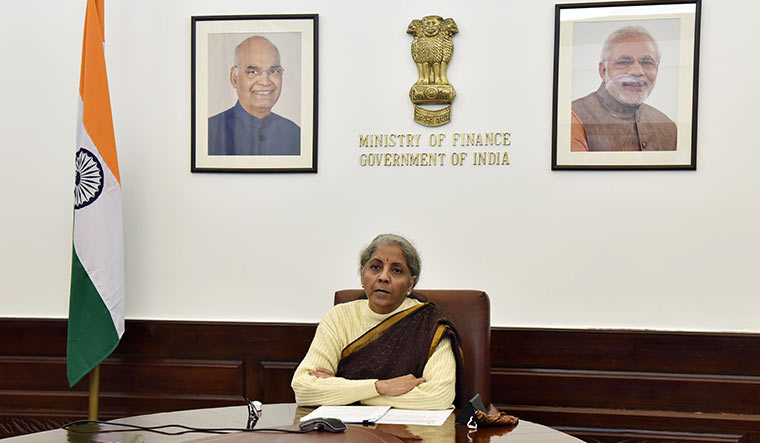Even as Prime Minister Narendra Modi released the clutch on sell-off of public sector companies with a slew of measures like cabinet reshuffle and amending laws to fast-track the process, the question remains whether finance minister Nirmala Sitharaman will be able to step on the accelerator, just yet.
Reasons as varied as a court case in a foreign land and lack of parliamentary approval to even elections are hindering the strategic disinvestment target of the government this financial year. It now seems almost certain that many of the big ticket sell-offs, especially those of public sector (PSU) banks as also the IPO of the Life Insurance Corporation (LIC) may end up spilling over into the next financial year.
This also means that the government may not be able to meet the Rs 1.75 lakh crore it had set as its target from disinvestment, back when it was announced in the Union budget in February. Then (as also in her previous budget), Sitharaman had set out a roadmap for 'strategic disinvestment' of PSUs ranging from Air India and Bharat Petroleum to a minority stake sale of Life Insurance Corporation via an IPO.
“We have good confidence that revenue generation will improve through this year and we are confident that we will be bringing non-tax revenue other than just disinvestments through various other monetisation of assets,” she had said a few days later addressing a session with leading Indian industrialists.
Of course, even as the government's need to mop up fresh sources of revenue spike as tax revenues dwindle due to the onslaught of the multiple waves of the pandemic on economic activity, the privatisation process seems unlikely to shift into top gear in the remaining seven months of this financial year.
This, even as Modi has been in a hurry to streamline and set the stage — last month’s cabinet reshuffle saw the department of public enterprises, that oversees the functioning of PSUs, being brought under the finance ministry from its erstwhile Heavy Industries ministry home. Being under one FinMin umbrella along with the Department of Public Asset Management (DIPAM, the current name for the erstwhile disinvestment ministry) as well as Corporate Affairs, it is hoped will help in swift decision-making and catalyse the sell-off effort.
However, there are hindrances galore. The much-delayed Air India disinvestment may not be possible quickly now, considering the many cases filed for attaching Air India planes and assets across the world by the likes of Cairn Energy and Devas Multimedia as part of getting the international arbitration awards won by them against the Indian government. The dismal state of the aviation sector after Covid hit also means a good valuation for the Maharajah, if the sale were to happen now, would be near impossible.
Bank privatisation would also be delayed—this year’s budget had stated that two state-owned banks and one general insurance company, beside a minority stake sale of LIC through IPO will be taken up within March 31, 2022. Banks are state-owned financial companies, which means a separate parliamentary approval would be needed. This requirement, along with a clever drafting of the terms of sale to ensure no bank employee loses their job (as has been promised by the minister) even while keeping them attractive enough to prospective buyers mean the process will be definitely delayed to next financial year.
Bank employees being a unionised, politically influential lot, the upcoming UP assembly polls slated in February may also have weighed in on the decision-makers in deferring this.
The LIC IPO remains one sure-fire bet under the circumstances for the government to meet its sell-off target — even a minority sale of the insurance giant could net the government upward of Rs 1 lakh crore easily. The gold rush at the bourses also augurs well for it. But here again, it is unclear whether bureaucracy can work fast enough to pull it off within March 31.
One possible option is to speed through the disinvestment of the oil major Bharat Petroleum (BPCL). Last week, the cabinet approved 100 per cent foreign investment in a public sector company if it is being strategically disinvested by the government. The move is aimed at removing an encumbrance foreign bidders will face in taking over BPCL, since officially FDI limit in oil companies remains at 49 per cent. This will straightaway benefit the selling of the government's 52 per cent stake in Bharat Petroleum, considering that two out of the three bidders are foreign companies (equity fund companies Apollo Global and Think Gas). The third bidder is Indian conglomerate Vedanta.





